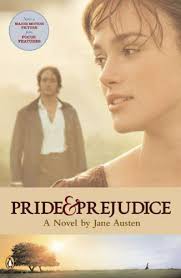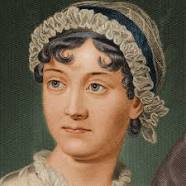Pride and Prejudice Page #13
Pride and Prejudice is a romantic novel by Jane Austen, first published in 1813. The story charts the emotional development of the protagonist, Elizabeth Bennet, who learns the error of making hasty judgments and comes to appreciate the difference between the superficial and the essential. The comedy of the writing lies in the depiction of manners, education, marriage, and money during the British Regency period.
“Indeed I do not dare.” Elizabeth, having rather expected to affront him, was amazed at his gallantry; but there was a mixture of sweetness and archness in her manner which made it difficult for her to affront anybody; and Darcy had never been so bewitched by any woman as he was by her. He really believed, that were it not for the inferiority of her connections, he should be in some danger. Miss Bingley saw, or suspected enough to be jealous; and her great anxiety for the recovery of her dear friend Jane received some assistance from her desire of getting rid of Elizabeth. She often tried to provoke Darcy into disliking her guest, by talking of their supposed marriage, and planning his happiness in such an alliance. “I hope,” said she, as they were walking together in the shrubbery the next day, “you will give your mother-in-law a few hints, when this desirable event takes place, as to the advantage of holding her tongue; and if you can compass it, do cure the younger girls of running after officers. And, if I may mention so delicate a subject, endeavour to check that little something, bordering on conceit and impertinence, which your lady possesses.” “Have you anything else to propose for my domestic felicity?” “Oh! yes. Do let the portraits of your uncle and aunt Phillips be placed in the gallery at Pemberley. Put them next to your great-uncle the judge. They are in the same profession, you know, only in different lines. As for your Elizabeth's picture, you must not have it taken, for what painter could do justice to those beautiful eyes?” “It would not be easy, indeed, to catch their expression, but their colour and shape, and the eyelashes, so remarkably fine, might be copied.” At that moment they were met from another walk by Mrs. Hurst and Elizabeth herself. “I did not know that you intended to walk,” said Miss Bingley, in some confusion, lest they had been overheard. “You used us abominably ill,” answered Mrs. Hurst, “running away without telling us that you were coming out.” Then taking the disengaged arm of Mr. Darcy, she left Elizabeth to walk by herself. The path just admitted three. Mr. Darcy felt their rudeness, and immediately said: “This walk is not wide enough for our party. We had better go into the avenue.” But Elizabeth, who had not the least inclination to remain with them, laughingly answered: “No, no; stay where you are. You are charmingly grouped, and appear to uncommon advantage. The picturesque would be spoilt by admitting a fourth. Good-bye.” She then ran gaily off, rejoicing as she rambled about, in the hope of being at home again in a day or two. Jane was already so much recovered as to intend leaving her room for a couple of hours that evening. Chapter 11 When the ladies removed after dinner, Elizabeth ran up to her sister, and seeing her well guarded from cold, attended her into the drawing-room, where she was welcomed by her two friends with many professions of pleasure; and Elizabeth had never seen them so agreeable as they were during the hour which passed before the gentlemen appeared. Their powers of conversation were considerable. They could describe an entertainment with accuracy, relate an anecdote with humour, and laugh at their acquaintance with spirit. But when the gentlemen entered, Jane was no longer the first object; Miss Bingley's eyes were instantly turned toward Darcy, and she had something to say to him before he had advanced many steps. He addressed himself to Miss Bennet, with a polite congratulation; Mr. Hurst also made her a slight bow, and said he was “very glad;” but diffuseness and warmth remained for Bingley's salutation. He was full of joy and attention. The first half-hour was spent in piling up the fire, lest she should suffer from the change of room; and she removed at his desire to the other side of the fireplace, that she might be further from the door. He then sat down by her, and talked scarcely to anyone else. Elizabeth, at work in the opposite corner, saw it all with great delight. When tea was over, Mr. Hurst reminded his sister-in-law of the card-table--but in vain. She had obtained private intelligence that Mr. Darcy did not wish for cards; and Mr. Hurst soon found even his open petition rejected. She assured him that no one intended to play, and the silence of the whole party on the subject seemed to justify her. Mr. Hurst had therefore nothing to do, but to stretch himself on one of the sofas and go to sleep. Darcy took up a book; Miss Bingley did the same; and Mrs. Hurst, principally occupied in playing with her bracelets and rings, joined now and then in her brother's conversation with Miss Bennet. Miss Bingley's attention was quite as much engaged in watching Mr. Darcy's progress through his book, as in reading her own; and she was perpetually either making some inquiry, or looking at his page. She could not win him, however, to any conversation; he merely answered her question, and read on. At length, quite exhausted by the attempt to be amused with her own book, which she had only chosen because it was the second volume of his, she gave a great yawn and said, “How pleasant it is to spend an evening in this way! I declare after all there is no enjoyment like reading! How much sooner one tires of anything than of a book! When I have a house of my own, I shall be miserable if I have not an excellent library.” No one made any reply. She then yawned again, threw aside her book, and cast her eyes round the room in quest for some amusement; when hearing her brother mentioning a ball to Miss Bennet, she turned suddenly towards him and said: “By the bye, Charles, are you really serious in meditating a dance at Netherfield? I would advise you, before you determine on it, to consult the wishes of the present party; I am much mistaken if there are not some among us to whom a ball would be rather a punishment than a pleasure.” “If you mean Darcy,” cried her brother, “he may go to bed, if he chooses, before it begins--but as for the ball, it is quite a settled thing; and as soon as Nicholls has made white soup enough, I shall send round my cards.” “I should like balls infinitely better,” she replied, “if they were carried on in a different manner; but there is something insufferably tedious in the usual process of such a meeting. It would surely be much more rational if conversation instead of dancing were made the order of the day.” “Much more rational, my dear Caroline, I dare say, but it would not be near so much like a ball.” Miss Bingley made no answer, and soon afterwards she got up and walked about the room. Her figure was elegant, and she walked well; but Darcy, at whom it was all aimed, was still inflexibly studious. In the desperation of her feelings, she resolved on one effort more, and, turning to Elizabeth, said:
Translation
Translate and read this book in other languages:
Select another language:
- - Select -
- 简体中文 (Chinese - Simplified)
- 繁體中文 (Chinese - Traditional)
- Español (Spanish)
- Esperanto (Esperanto)
- 日本語 (Japanese)
- Português (Portuguese)
- Deutsch (German)
- العربية (Arabic)
- Français (French)
- Русский (Russian)
- ಕನ್ನಡ (Kannada)
- 한국어 (Korean)
- עברית (Hebrew)
- Gaeilge (Irish)
- Українська (Ukrainian)
- اردو (Urdu)
- Magyar (Hungarian)
- मानक हिन्दी (Hindi)
- Indonesia (Indonesian)
- Italiano (Italian)
- தமிழ் (Tamil)
- Türkçe (Turkish)
- తెలుగు (Telugu)
- ภาษาไทย (Thai)
- Tiếng Việt (Vietnamese)
- Čeština (Czech)
- Polski (Polish)
- Bahasa Indonesia (Indonesian)
- Românește (Romanian)
- Nederlands (Dutch)
- Ελληνικά (Greek)
- Latinum (Latin)
- Svenska (Swedish)
- Dansk (Danish)
- Suomi (Finnish)
- فارسی (Persian)
- ייִדיש (Yiddish)
- հայերեն (Armenian)
- Norsk (Norwegian)
- English (English)
Citation
Use the citation below to add this book to your bibliography:
Style:MLAChicagoAPA
"Pride and Prejudice Books." Literature.com. STANDS4 LLC, 2025. Web. 10 Jan. 2025. <https://www.literature.com/book/pride_and_prejudice_9>.




Discuss this Pride and Prejudice book with the community:
Report Comment
We're doing our best to make sure our content is useful, accurate and safe.
If by any chance you spot an inappropriate comment while navigating through our website please use this form to let us know, and we'll take care of it shortly.
Attachment
You need to be logged in to favorite.
Log In